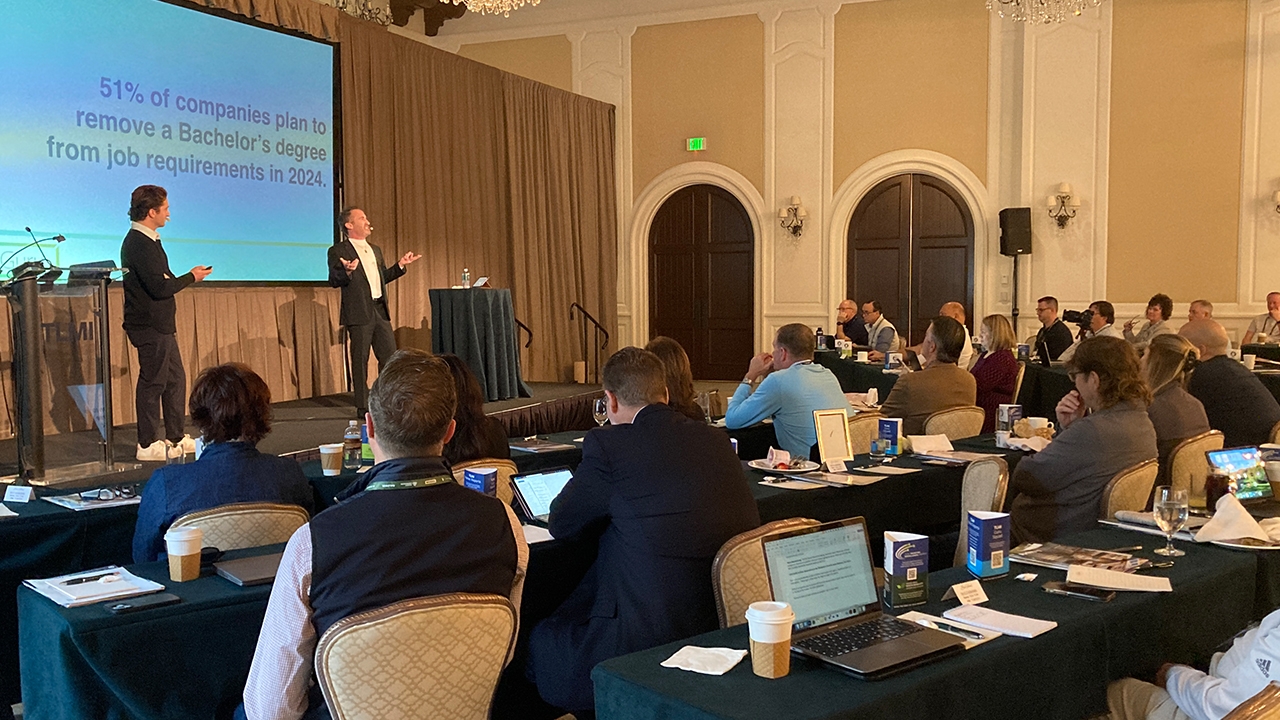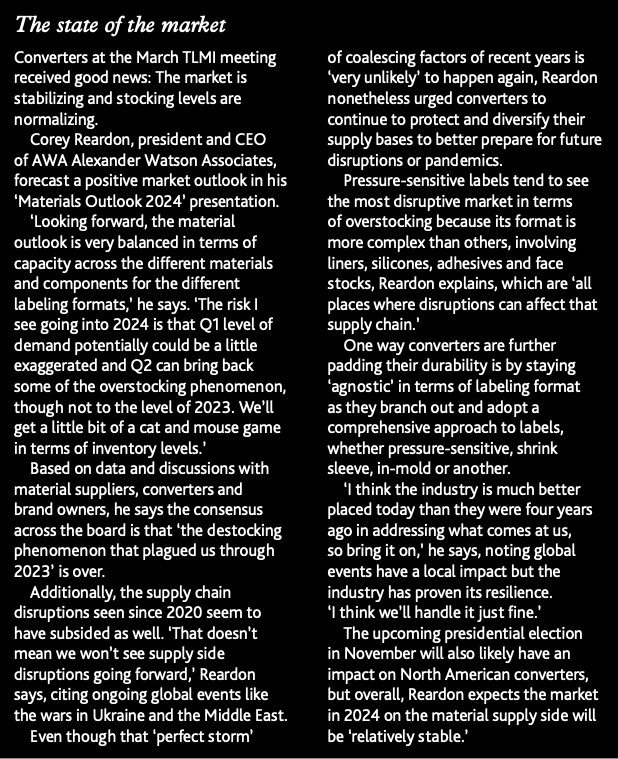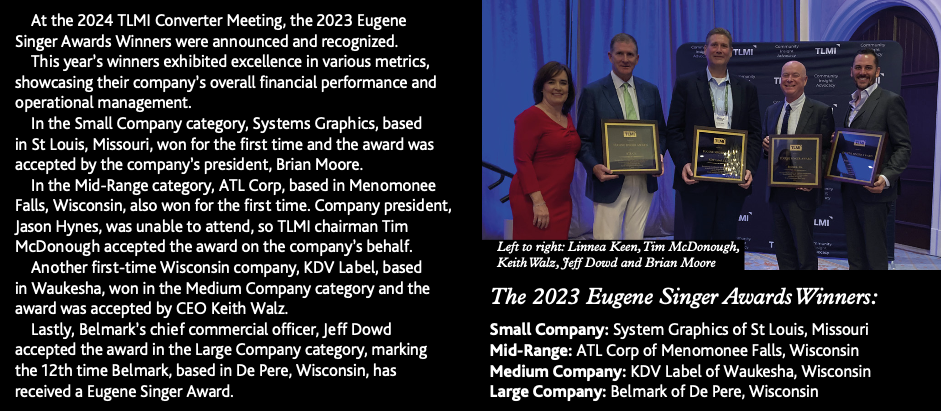Labor pains: TLMI addresses workforce issues at converter meeting
Conversations at the TLMI Converter Meeting centered largely around workforce issues and how to engage the next generation.

A TLMI converter session on generations in the workplace by David and Jonah Stillman of GenGuru
Ask a child what they want to be when they grow up, and they often say: a doctor, an astronaut, a basketball player — or nowadays, a social media influencer. Why not a label converter, a press operator or production manager?
Labels are an integral, yet often overlooked, part of daily life, and converters beset by the broken labor market are looking for ways to join the conversation of childhood dreams, where careers begin.
From labor shortages and succession planning to Gen Z in the workplace, workforce issues arguably stood at the heart of this year’s TLMI Converter Meeting, hosted in March at The Cloisters in Sea Island, Georgia.
“Partner with as many trade schools as possible and make sure you get on their radar as a great opportunity for employment. By junior year of college, it’s too late”
The event featured sessions about the state of the industry and the uncertainty of the economy, while much of the converters’ discussions revolved around how to attract and retain talent, particularly to fill second and third shifts. Business owners also debated people-driven alternatives to mergers and acquisitions that have largely dominated the industry in recent years.
Engaging the next generation
While industry veterans are prone to putting off retirement, wondering, ‘Why would I retire? I love what I do,’ the younger generation, TLMI converters said, don’t seem as vested or connected.
A panel session titled ‘Succession Planning: Alternatives to Selling to PE,’ offered perspectives from three different-sized converters that had opted to not sell to private equity.
Hosted by Andrea Crane of Crane Talent Group, the panelists – Craig Curran of Nosco, Bill Muir of Grand Rapid Labels and Liz Pecha-Poelker of PrintFlex Graphics – discussed the pros and cons of their respective succession strategies: employee stock ownership (ESOP); a family-owned and professionally managed company; and a family-owned and operated company.
Despite their varying approaches, they all shared a common challenge: rousing the next leaders, whether the latest group of new hires unfamiliar with ESOPs or the succeeding generations like the ‘G4’ or ‘G5,’ as the panelists referred to those in line to take up the family mantle.
‘If they have no connection to the business, they’re not going to have the same sort of values as G4,’ Muir says, adding that is his generation’s homework, to better engage G5, which is spread across the country and don’t have as many opportunities to learn the family business.
Enticing Gen Z
One bright spot for many employers is Gen Z, a generation ‘bred to be competitive’, as father-son duo David and Jonah Stillman of GenGuru further explored at the TLMI meeting.
Most Gen Z — 67 percent — enter university with a predetermined career in mind, David Stillman says. ‘So, what does that mean for all of you? The question I’m going to ask you is: are you on the radar early enough?
‘Because what we know about this generation is they’re sitting in high school, daydreaming out the window, to go work for brands that are front and center.’
So, if you’re not Meta or Spotify, what does that mean? You need to get your company on their radar earlier.

‘Partner with as many trade schools as possible and make sure you get on their radar as a great opportunity for employment,’ David Stillman says. ‘By junior year of college, it’s too late.’
For the most part, Gen Z is likely not aware of the ‘robust career offerings’ available in the industry, unless they grew up in the family business talking about labels around the dinner table.
‘Making sure that young employees are able to see those career options is very important,’ Jonah Stillman adds. ‘Exposing young employees to resources like [TLMI’s Label Leaders of Tomorrow] is so important because we know it’s one of the strongest retention strategies for the Gen Z employees, showing them all the different places that they can go if they choose a career in this industry.’
Looking to automation
Meanwhile, artificial intelligence (AI) and automation have emerged as potential solutions to the people problem.
Adam Peek, senior vice president of sales at Meyers Printing and host of the People of Packaging podcast, was invited to give a talk titled: ‘Don’t Turn Your Back to the Future: How Sustainability, Social Media and Innovation are Impacting the Industry.’ Peek put it simply: ‘The robots are coming for your children.’
“I think the industry is much better placed today than they were four years ago in addressing what comes at us, so bring it on. I think we’ll handle it just fine"
Peek, whose weekly newsletter ‘Packaging is Awesome’ has over 6,400 subscribers, told converters: ‘Blockchain, AI and robotics are right now the three things that I get asked the most about.’
‘Based on the conversations that I’m having and based on the way I see technology going, this is a possible future state for us in our industry.’
Because bottom line, he says: ‘Nobody wants to buy stuff from you. They just want the stickers. They just want to buy the labels to go with their products.
‘And there is technology that exists right now that I think should be making sales, marketing, estimating, prepress pretty nervous.’
So, prepare now, Peek says. It won’t happen tomorrow, but it is the future.
For better or worse, for now, things seem to be the status quo on the labor front.
Claudia St John of The Workplace Advisors, who presented ‘TLMI Compensation and Benefits Survey Results and Workplace Trends,’ says the hiring frenzy of 2021 seems to be over, but no one seems to be laying off, either.
As St John surmised, things appear to be in ‘a wait-and-see mode’ as converters continue to navigate a tight labor market amid rising costs and increasing innovation.

Stay up to date
Subscribe to the free Label News newsletter and receive the latest content every week. We'll never share your email address.

